Related Research Articles
Gödel's ontological proof is a formal argument by the mathematician Kurt Gödel (1906–1978) for the existence of God. The argument is in a line of development that goes back to Anselm of Canterbury (1033–1109). St. Anselm's ontological argument, in its most succinct form, is as follows: "God, by definition, is that for which no greater can be conceived. God exists in the understanding. If God exists in the understanding, we could imagine Him to be greater by existing in reality. Therefore, God must exist." A more elaborate version was given by Gottfried Leibniz (1646–1716); this is the version that Gödel studied and attempted to clarify with his ontological argument.
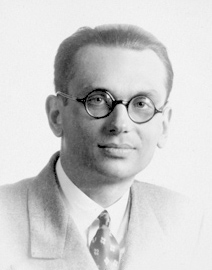
Kurt Friedrich Gödel was a logician, mathematician, and philosopher. Considered along with Aristotle and Gottlob Frege to be one of the most significant logicians in history, Gödel profoundly influenced scientific and philosophical thinking in the 20th century, building on earlier work by Frege, Richard Dedekind, and Georg Cantor.
In the philosophy of mathematics, intuitionism, or neointuitionism, is an approach where mathematics is considered to be purely the result of the constructive mental activity of humans rather than the discovery of fundamental principles claimed to exist in an objective reality. That is, logic and mathematics are not considered analytic activities wherein deep properties of objective reality are revealed and applied, but are instead considered the application of internally consistent methods used to realize more complex mental constructs, regardless of their possible independent existence in an objective reality.
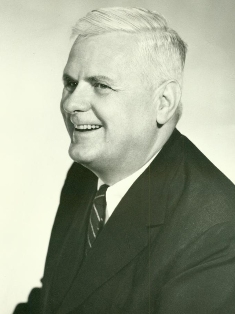
Alonzo Church was an American computer scientist, mathematician, logician, and philosopher who made major contributions to mathematical logic and the foundations of theoretical computer science. He is best known for the lambda calculus, the Church–Turing thesis, proving the unsolvability of the Entscheidungsproblem, the Frege–Church ontology, and the Church–Rosser theorem. Alongside his doctoral student Alan Turing, Church is considered one of the founders of computer science.
Gödel's incompleteness theorems are two theorems of mathematical logic that are concerned with the limits of provability in formal axiomatic theories. These results, published by Kurt Gödel in 1931, are important both in mathematical logic and in the philosophy of mathematics. The theorems are widely, but not universally, interpreted as showing that Hilbert's program to find a complete and consistent set of axioms for all mathematics is impossible.

Alfred Tarski was a Polish-American logician and mathematician. A prolific author best known for his work on model theory, metamathematics, and algebraic logic, he also contributed to abstract algebra, topology, geometry, measure theory, mathematical logic, set theory, and analytic philosophy.
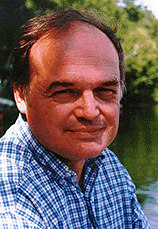
George Stephen Boolos was an American philosopher and a mathematical logician who taught at the Massachusetts Institute of Technology.
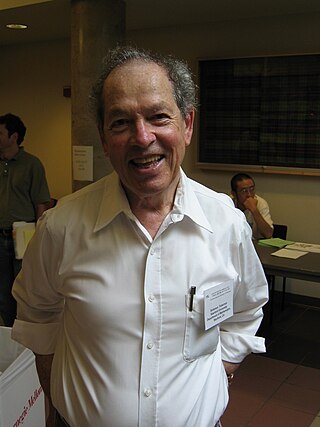
Solomon Feferman was an American philosopher and mathematician who worked in mathematical logic. In addition to his prolific technical work in proof theory, computability theory, and set theory, he was known for his contributions to the history of logic and as a vocal proponent of the philosophy of mathematics known as predicativism, notably from an anti-platonist stance.

Hao Wang was a Chinese-American logician, philosopher, mathematician, and commentator on Kurt Gödel.
"Über formal unentscheidbare Sätze der Principia Mathematica und verwandter Systeme I" is a paper in mathematical logic by Kurt Gödel. Submitted November 17, 1930, it was originally published in German in the 1931 volume of Monatshefte für Mathematik und Physik. Several English translations have appeared in print, and the paper has been included in two collections of classic mathematical logic papers. The paper contains Gödel's incompleteness theorems, now fundamental results in logic that have many implications for consistency proofs in mathematics. The paper is also known for introducing new techniques that Gödel invented to prove the incompleteness theorems.

Charles Dacre Parsons was an American philosopher best known for his work in the philosophy of mathematics and the study of the philosophy of Immanuel Kant. He was professor emeritus at Harvard University. In a 2014 review of one of his books, Stewart Shapiro and Teresa Kouri said of Parsons: "It surely goes without saying that [he] is one of the most important philosophers of mathematics in our generation".

Ivor Owen Grattan-Guinness was a historian of mathematics and logic.
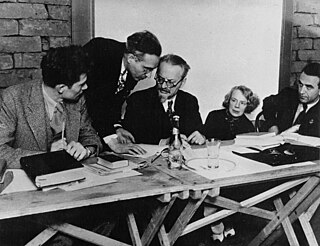
Jean Louis Maxime van Heijenoort was a historian of mathematical logic. He was also a personal secretary to Leon Trotsky from 1932 to 1939, and an American Trotskyist until 1947.

Paul Isaac Bernays was a Swiss mathematician who made significant contributions to mathematical logic, axiomatic set theory, and the philosophy of mathematics. He was an assistant and close collaborator of David Hilbert.

Burton Spencer Dreben was an American philosopher specializing in mathematical logic. A Harvard graduate who taught at his alma mater for most of his career, he published little but was a teacher and a critic of the work of his colleagues.

Karl Sigmund is a Professor of Mathematics at the University of Vienna and one of the pioneers of evolutionary game theory.

The Brouwer–Hilbert controversy was a debate in twentieth-century mathematics over fundamental questions about the consistency of axioms and the role of semantics and syntax in mathematics. L. E. J. Brouwer, a proponent of the constructivist school of intuitionism, opposed David Hilbert, a proponent of formalism. Much of the controversy took place while both were involved with Mathematische Annalen, the leading mathematical journal of the time, with Hilbert as editor-in-chief and Brouwer as a member of its editorial board. In 1928, Hilbert had Brouwer removed from the editorial board of Mathematische Annalen.

Michael Detlefsen was an American philosopher who was a McMahon-Hank Professor of Philosophy at the University of Notre Dame. His areas of special interest were logic, history of mathematics, philosophy of mathematics and epistemology.

Wolfgang Rautenberg was a German mathematician and logician whose areas of research were model theory, non-classical logic, modal logic, temporal logic and self reference.
Juliette Kennedy is an associate professor in the Department of Mathematics and Statistics at the University of Helsinki. Her main research interests are mathematical logic and the foundations of mathematics. In the course of her work she has published extensively on the works of Kurt Gödel.
References
- ↑ Date information sourced from Library of Congress Authorities data, via corresponding WorldCat Identities linked authority file (LAF) .
- ↑ John William Dawson Jr., Mathematics Genealogy Project. Accessed January 28, 2010
- ↑ Editorial Board, Archived 2010-07-04 at the Wayback Machine History and Philosophy of Logic, Taylor and Francis. Accessed January 28, 2010